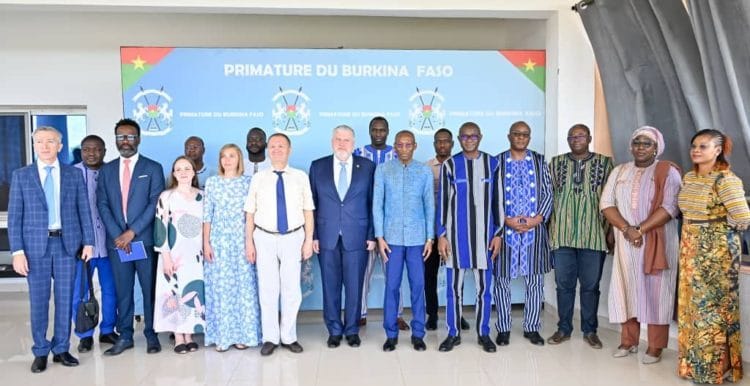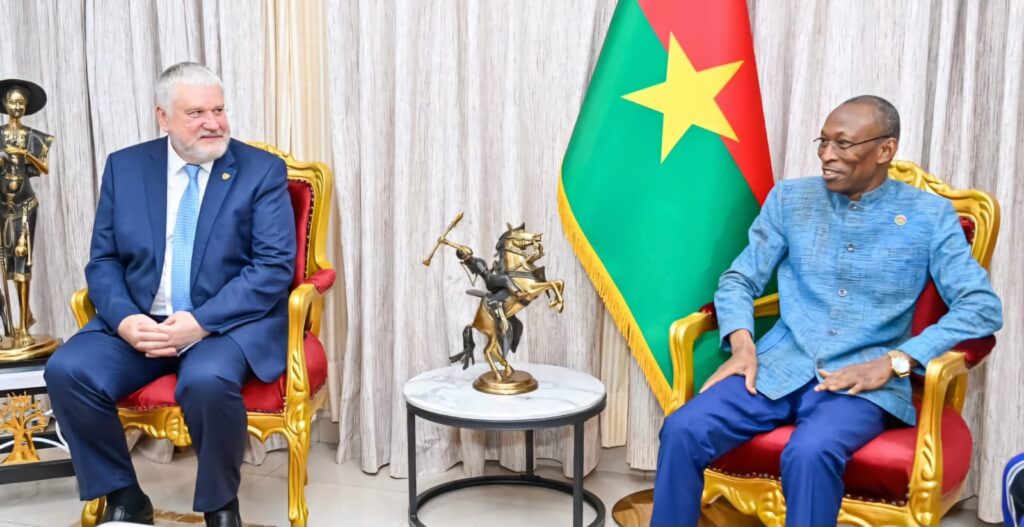Prime Minister Dr. Apollinaire Joachimson KYÉLEM de TAMBÈLA met with a delegation from Rosatom, led by the Russian ambassador to Ouagadougou, Igor Martynov, on Thursday, August 8, 2024. The meeting in Ouagadougou focused on Rosatom’s role in constructing a civil nuclear power plant in Burkina Faso, a project designed to address the nation’s increasing energy demands.
Prime Minister Dr. Apollinaire Joachimson KYÉLEM de TAMBÈLA warmly welcomed the Rosatom delegation, stating, “You are at home.” He highlighted the project’s vital role for Burkina Faso, which frequently experiences power outages during the hot months from March to May.

“We face a serious energy challenge in Burkina Faso. During the heat of March, April, and May, there are frequent power cuts, and when they occur, everything stops. We are determined to resolve this issue,” he explained.
Burkina Faso has recently deepened its partnership with Russia, selecting the nation as a key ally not only in military matters but also in economic and cultural areas. This decision reflects a desire to distance itself from French colonial influence, which, according to the Prime Minister, has impeded the country’s progress for more than six decades.
“We have now aligned with Russia as our strategic partner in military, economic, and cultural domains because our former colonizer, France, never fully recognized our independence and still regards us as a colony. For over 60 years, this has stunted our growth, and we believe it’s time to shift our strategy. This is why we have chosen to partner with Russia,” the Prime Minister stated.
The civil nuclear power plant project, a key topic of discussion during this meeting, is a top priority for the Burkinabe government. The Prime Minister also reiterated the commitment made by the President of Faso during his meeting with President Vladimir Putin last July.
The government is considering interim measures, such as thermal power plants, to address immediate energy demands while awaiting the construction of the new plant, he said.
“Our president conveyed to President Vladimir Putin last July that we seek a large-scale nuclear power plant. In the meantime, we require temporary solutions like thermal power plants or other energy facilities,” he stated.
Dr. KYÉLEM de TAMBÈLA also highlighted the need to shift Burkinabe military training to Russia, replacing the training previously conducted in Europe.
“Previously, we conducted training and specializations in countries like France and Germany. Now that we are moving away from Europe, this option is no longer available. We therefore anticipate that our soldiers will undergo advanced training in Russia and potentially set up training centers in Burkina Faso,” he noted.
He also mentioned significant projects such as the Bamako-Ouagadougou-Niamey railway, for which he hopes to see Russia play an active role. The Russian Ambassador highlighted Russia’s historical partnership with Africa, noting that it has never colonized or exploited the continent’s resources.
“Your decision to turn to Russia is likely deliberate,” he said, underscoring Russia’s support for Burkina Faso in its fight against terrorism and efforts toward energy independence.
“The primary goals are to overcome terrorism and achieve energy self-sufficiency. These two objectives are fundamental for building a strong economy,” the ambassador added.
The ambassador highlighted Rosatom as a unique organization globally, boasting advanced technologies in atomic health, thermal energy, and atomic medicine.

He assured that the nuclear power plant project in Burkina Faso is viable, provided Russian technicians can operate smoothly and the required agreements with the International Atomic Energy Agency (IAEA) are finalized.
He concluded by emphasizing the need for close coordination among all branches of the Burkinabe Government to ensure the project’s success. “There is considerable work ahead. We would greatly appreciate the assistance of every government official and department,” he stated.
This partnership between Burkina Faso and Russia marks a significant advancement in the country’s efforts to achieve energy and economic independence through broadened and diversified international relationships.


